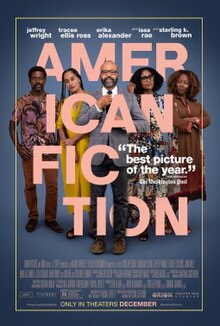By Andrew Jenck
The Academy Awards has always followed certain trends, particularly with its Best Picture nominees. Every year, at least one film spearheaded by great performances, is entertaining, and contains important commentary while every other aspect is functional but nothing special. American Fiction is a witty critique of unintentional racism within literacy; while in parts undercooked, often rushing between its bullet points, the work overall is well-rounded and hilarious in a satisfying manner.
Full disclosure, I have a limited perspective on the subject matter covered by the piece, being a white male. It’s highly encouraged that any reader also seeks out the opinions of African Americans on American Fiction, and any films in general. Filmmaking analysis of filmmaking is universal, so it’s fair to decipher its presentation and pacing in this film.
In this modern landscape, the premise is refreshingly original. Jeffry Wright plays a disgruntled author, unable to sell his more underscored stories while more stereotypical black books are topping the sales chart. Wanting to prove this as problematic, he writes the most unsubtle and demeaning story he can think of, only for it to become a bestseller; one he begrudgingly accepts with looming financial difficulties surrounding family issues.
The script could’ve streamlined the first act, but it does a fair job in establishing the characters prior to the driving force of the plot. Wright isn’t just playing a writer; fleshed out with flaws affecting his relationships intertwined with his approach to writing. Humorous interactions balanced with melodrama give the dialogue a more naturalistic feel. The film is at its best when the characters are at odds with each other, having to work through realistic struggles and family drama. Interactions are natural; their situations feel universal; anyone can relate to them. It strengthens the message of black stories without being stereotypical.
Handling of its core themes is good with several hinderances. Black writers needing to present their stories to a primarily white audience provides an opportunity for funny commentary. Often the publishers are caricatures yet deliver the point with the biggest laughs coming from Wright’s reaction to their shortsightedness. Many well-intended individuals can be prone to paying lip service in addressing diversity without understanding the nuances behind colorism. A core theme is presenting oneself as to others as they would expect based on their stereotypes. Some of the best jokes are Wright playing up his rigid, conman persona in attempting to sell the book as a work of nonfiction.
Jeffry Wright has always been a dependable actor and he shines in a much-deserved starring role; his career itself shows how underutilized Black talent can be in the entertainment industry. The rest of the cast is on point, especially Sterling Hollow who is smoothly charismatic.
Pacing and several motifs could be tighter. Ironically, I found myself wanting more perspectives of the Black people, with one character expressing positivity but which is quickly brushed off. It’s rare to see two African Americans argue over what is or isn’t racist but it’s not focused on. Although consistently funny, some scenes feel repetitive. If one isn’t fond of overt comedy, they may find the script annoying. Transitions between the publication and the family drama can feel awkward. There’s a long stretch before conceiving the book, so it can feel as if the film is stalling. One scene visualizes the writing process in a clever way but the rest of the direction, although competent, is standard, where there could’ve been more visual flare.
Insightful and hilarious, while occasionally undercooked, American Fiction is an all-around crowd-pleaser that deserves its Oscar nominations while not as fully formed as its other Best Picture contemporaries. For some it could feel like they are being spoon-fed its messages, but the execution still makes for an entertaining romp with relatability and humanity at its core. With its success, hopefully there can be more stories of this type, especially for Black characters. Hollywood would be misreading the story otherwise.


